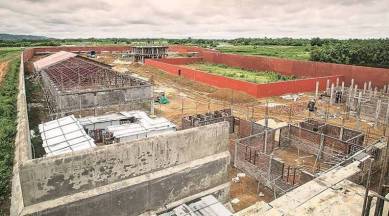Stay updated with the latest - Click here to follow us on Instagram
HC rap for Assam govt over transit camp housing men held in child marriage cases
Challenging the notifications by which jails were converted into detention centres, the petitions sought the release of the detainees. The petitions, which made a case for more humane detention, were filed in 2020 by a team of lawyers and activists, facilitated by Studio Nilima, a research collective.

Describing it as “prima facie unacceptable”, the Gauhati High court on Tuesday rapped the Assam government for converting part of the Matia Transit Camp meant for ‘illegal foreigners’ into a “temporary jail” to house those arrested in the state’s recent drive against child marriage.
Since February 5, following a space crunch in existing jails due to mass arrests in the drive, at least 350 people have been imprisoned in Matia, after the state Home Department officially notified a part of it as a “temporary jail”, until further orders.
monthly limit of free stories.
with an Express account.
Matia had become operational only a week before that, on January 27, with the government moving 68 “foreigners” to the camp following an HC order.
Chief Justice of Gauhati HC Sandeep Mehta told state Advocate General D Saikia in Tuesday’s hearing: “This is something strange and prima facie unacceptable. What is the justification? If you want to enhance your prison capacity, do it in the place where your prisons are constructed. Why do you need to convert this detention centre to a prison?”
The hearing by a division bench of Chief Justice Mehta and Justice Soumitra Saikia was centred on a batch of habeas corpus petitions, which challenged the detention of convicted and declared foreign nationals in Assam’s jails.
Challenging the notifications by which jails were converted into detention centres, the petitions sought the release of the detainees. The petitions, which made a case for more humane detention, were filed in 2020 by a team of lawyers and activists, facilitated by Studio Nilima, a research collective.
The move to transfer the “foreigners” to Matia followed an order by Gauhati HC (in the same batch of petitions) on November 29 last year — the court directed the government to make the Matia camp operational, as it was “ready for habitation”. The bench, which then comprised Justice Saikia and then Chief Justice R M Chhaya, had visited the transit camp.
The following hearings on December 20 and January 27 were adjourned.
On Tuesday, the petitioners argued that with Matia now officially notified as a jail, “all the bona fides that they [government] had submitted till date was set to nought.”
“The baby gets thrown out with the bath water…. Essentially, they are now housing foreign nationals (declared foreign nationals and convicted foreign nationals) along with citizens who are criminals,” the advocate representing the petitioners argued.
Advocate General Saikia submitted that he will get instructions and “correct ourselves if we are wrong.” He said, “I have to get up-to-date information, but prima facie what I have got to know is that the capacity of this campus consists of 3,000 persons. Hardly less than 200 persons are there in detention.”
Chief Justice Mehta responded: “You have to do capacity-building exercises for prisons…you cannot encroach upon an institution [which is meant] only for persons…who are not convicts, nor [are they] offenders. They may be in the wrong place at the wrong time because of circumstances. But you cannot keep them with ordinary criminals.”
The next hearing is scheduled for Thursday.